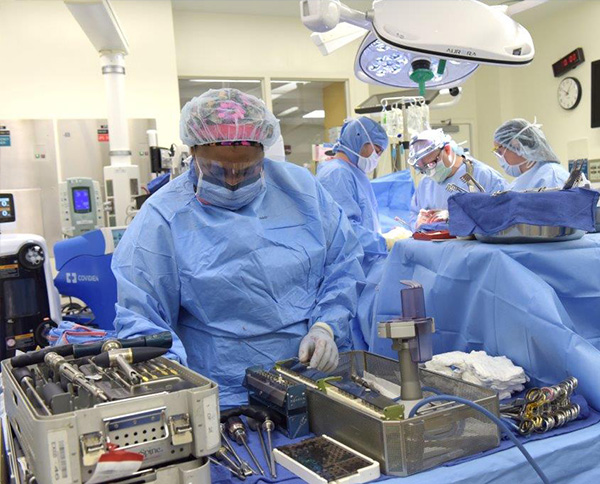Overview:
 A large quantity of any hospital’s environmental footprint is produced by its operating rooms. Studies estimate that between 20-30 percent of the total waste volume generated by a hospital comes from ORs. Operating rooms are one of the largest users of supplies within a hospital. Surgical kits often are wrapped with plastic after sterilization and boxed, and many instruments are individually wrapped – and that ends up in the waste stream. To address these issues, hospitals are exploring environmentally sustainable ways of managing operating room waste including: waste reduction, fluid management, single-use device reprocessing, OR kit reformulation, reusable supplies, LED lighting, more efficient ventilation and medical plastic recycling.
A large quantity of any hospital’s environmental footprint is produced by its operating rooms. Studies estimate that between 20-30 percent of the total waste volume generated by a hospital comes from ORs. Operating rooms are one of the largest users of supplies within a hospital. Surgical kits often are wrapped with plastic after sterilization and boxed, and many instruments are individually wrapped – and that ends up in the waste stream. To address these issues, hospitals are exploring environmentally sustainable ways of managing operating room waste including: waste reduction, fluid management, single-use device reprocessing, OR kit reformulation, reusable supplies, LED lighting, more efficient ventilation and medical plastic recycling.
Goals 2022:
1. Award reprocessing bid to increase ability to purchase reprocessed devices for cost savings and waste stream reductions.
2. Expand collection of SUD and purchasing or reprocessing devices to SBSHH and SBELIH after bid award.
3. Fully implement surgical smoke evacuation program for all appropriate cases as per NYS law effective 6/2023.
4. Review anesthetic gas usage to identify opportunities to reduce environmental impact.
Highlights:
A number of 2022 goals were achieved.
- Enhanced reprocessing program/selection of a new vendor and implementation of program: The collection of SUDs was re-initiated in July 2022 with Medline. A total of 4795 devices and 421 pounds collected from MOR and ASC at SBUH. The hospital started purchasing select reprocessed devices with larger bid currently in process to increase utilization, reducing waste stream and spend.
- Review SUD types identified in PGH OR award application Table B1 to determine additional devices to collect and/or purchase: The hospital shifted to re-usable tourniquet cuffs to ensure continued supply during substantial backorder issues. This change will continue for appropriate cases.
Recycling is a focus on reduction of waste in the OR and efforts are made on ensuring all used medical supplies are placed into recycling bins. In addition, we encourage the purchase of upcycled medical devices wherever feasible.
We have cut back on our use of “blue wrap” – the plastic material used for wrapping boxes of sterilized surgical instruments – by 30 percent in the past two years. We’ve achieved this by switching to reusable stainless steel containers, and sterilizing instruments inside them. This not only cuts back on blue wrap, it’s a more effective way of keeping instruments sterile in storage until they are needed in surgery. Metal containers hold instruments more securely and keep them from getting jostled and potentially breaking their wrapping which effect sterility.
Stony Brook ORs are working more efficiently, in several ways. Our “Greening the OR” team collaborates with clinicians to review surgical case packs (kits of supplies organized by surgical service). The annual accounting and reporting process identifies instruments not being used, so we can remove them from the packs reducing waste. We are working with our primary implant vendors to reduce tray weights and shift to validated containers whenever possible.
We have completely eliminated the use of EtO (ethylene oxide) gas, a highly toxic sterilizing agent for surgical instruments. We purchased Sterrads – sterilizing machines that use hydrogen peroxide, a cleaner and more efficient sterilizing agent. (Also see Safer Chemicals.)
To conserve energy in ORs, we have installed LED (light emitting diode) lights and completed a temperature setback initiative in the OR. In 2018, ambulatory surgery center setbacks were added. The two hybrid operating rooms were designed with setback capabilities after established operating room hours.
We have been reducing the use of ethylene oxide (ETO) for years. Finally, in 2021, we purchased the last needed scopes that were not able to be sterilized an alternate way, and shut off the remaining 2 ETO machines in November. This is a huge accomplishment, reducing our staff exposure and improving turnaround time.
We are working with our primary implant vendors to reduce tray weights and shift to validated containers whenever possible. We have updated out trays and surgeon preferences.
Recognition:
Practice Greenhealth has recognized the work of this group with Greening the OR awards in 2018, 2019, 2020, and 2022.
Our Central Sterile Department was named a runner-up for the Central Sterile/Sterile Processing Department of the Year national award from Healthcare Purchasing News. In 2018, 2019 and 2020, the OR received the "Greening the OR" recognition award from Practice Greenhealth.
Team:
*Ally Silver, Donna Hoffman, Mike DeMasi, Cynthia Jorgensen, and Martha Houlihan

